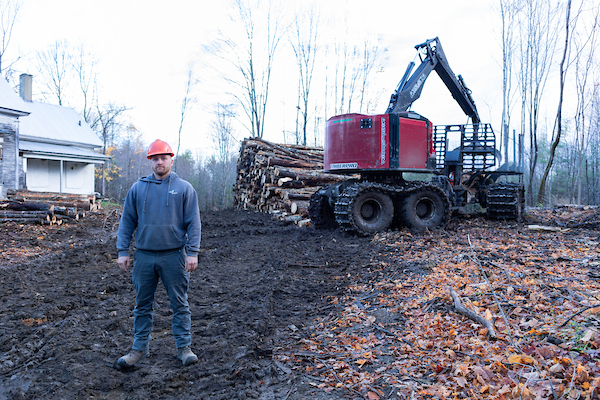
AVON — As was the case for most business owners this summer, Aaron Adams said it’s been a difficult season for GCA Logging, Inc. The Avon operation was established in 1988 by Adams’ late father, Greg, and was passed on to Adams’ management in 2017. The business has seen major growth over the years, going from five employees to 50, and becoming a leader for the local industry. But the last six months have brought doubts for Adams and GCA Logging.
“It’s really been the two things happening at once. There was the explosion at Pixelle, and that was bad. But then COVID just made all of that worse,” Adams said.
Pixelle Specialty Solutions LLC had only recently bought the Androscoggin mill from Verso Corporation when a pulp digester exploded. Nobody was hurt by the incident, but loggers throughout the area have taken a hit from the mill’s slowed production.
“We had a truck in the yard when the explosion happened, and we had three more on the way. We went from delivering 35 loads a week to zero,” Adams said.
According to Adams, logging industry had finally been “crawling out of a hole” from the closure of the Madison mill among other difficulties such as high fuel prices.
“Now we’re back to worse than what it was,” he said. “Everybody in logging is looking to diversify a little bit.”
Adams said a lot of contractors are treading water, waiting to hear what the future holds for Pixelle. The paper mill has undergone three waves of layoffs since July, reducing their workforce by 177 people. The most recent layoff took place this week.
Professional Logging Contractors of Maine have gone to bat in search of relief from the hard times, lobbying to be included in the many coronavirus relief packages.
In a letter to United States Department of Agriculture Secretary Sonny Perdue, Commissioner Amanda Beal reported that Maine loggers have seen 40 to 50 percent losses this year. Mill closures and limited production will lead to a 30 percent reduction in harvesting capacity, she stated, laying off 1,000 people in harvesting and hauling. The industry provides roughly 9,000 jobs to Maine residents, and contributes more than $620 million annually to the state’s economy.
A bill proposal of $2.5 billion to back the industry has been proposed to Congress.




